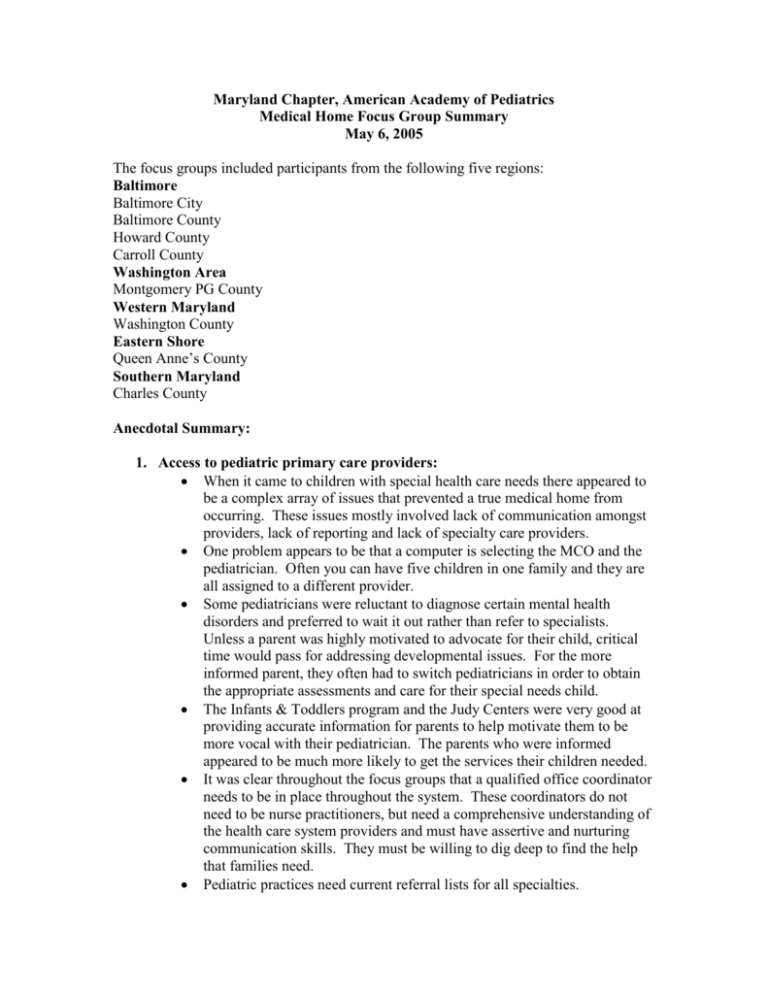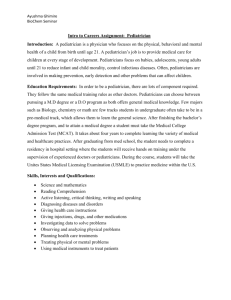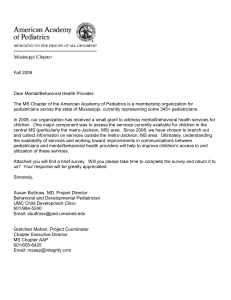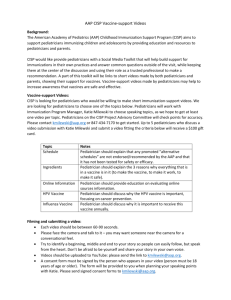Medical Home Focus Group summary
advertisement

Maryland Chapter, American Academy of Pediatrics Medical Home Focus Group Summary May 6, 2005 The focus groups included participants from the following five regions: Baltimore Baltimore City Baltimore County Howard County Carroll County Washington Area Montgomery PG County Western Maryland Washington County Eastern Shore Queen Anne’s County Southern Maryland Charles County Anecdotal Summary: 1. Access to pediatric primary care providers: When it came to children with special health care needs there appeared to be a complex array of issues that prevented a true medical home from occurring. These issues mostly involved lack of communication amongst providers, lack of reporting and lack of specialty care providers. One problem appears to be that a computer is selecting the MCO and the pediatrician. Often you can have five children in one family and they are all assigned to a different provider. Some pediatricians were reluctant to diagnose certain mental health disorders and preferred to wait it out rather than refer to specialists. Unless a parent was highly motivated to advocate for their child, critical time would pass for addressing developmental issues. For the more informed parent, they often had to switch pediatricians in order to obtain the appropriate assessments and care for their special needs child. The Infants & Toddlers program and the Judy Centers were very good at providing accurate information for parents to help motivate them to be more vocal with their pediatrician. The parents who were informed appeared to be much more likely to get the services their children needed. It was clear throughout the focus groups that a qualified office coordinator needs to be in place throughout the system. These coordinators do not need to be nurse practitioners, but need a comprehensive understanding of the health care system providers and must have assertive and nurturing communication skills. They must be willing to dig deep to find the help that families need. Pediatric practices need current referral lists for all specialties. 2. Reimbursement for services needs to increase to assure that all offices and clinics have qualified personnel to help assist pediatricians in accessing information and reports that go into the charts. A medical home surely depends upon the flow of information. Communication is absolutely key in creating this flow. Emails do not work, snail mail is somewhat effective, but faxes appear to be the most effective method of communication for enrollment, referrals and followup reports. Pediatrician’s need support and training for issues surrounding children with special health care needs. This is especially true for mental health issues. This should be a priority for all providers in the future. Creating a network of specialty care providers should go hand in hand with this training. Across the board, dental health care for children on medical assistance was a major gap. In some of the rural areas there may be one dentist who accepts pediatric patients. Children on medical assistance may wait for months for an appointment and end up with dental caries much worse than they would have otherwise had. If their parents have transportation they may cross county lines to find a dentist. For people without transportation this brings a whole new level of problems. Pediatric health providers and the evaluation of development, behavior and mental health issues. How well does your pediatrician assess developmental milestones? Pediatricians ask questions about developmental milestones, however because the Denver Developmental test takes so much time, almost no pediatrician completes that entire test during an office visit. This test is often done more thoroughly after the child is referred to Infants and Toddlers, but in pediatricians offices it is not used the way it was intended. It takes about 30 minutes to do and most pediatricians do not have that kind time to spend. Because some parents have so much trouble getting appointments for other kinds of developmental evaluations it is often months or years before a child is adequately assessed for developmental issues. In Baltimore City, there is a developmental pediatrician who volunteers!! This pediatrician is part of the Infants and Toddlers assessment team. With all the things that need to happen in that very short time, it was felt that there was too much to do in so little time. It was felt that developing a relationship with the parent and child takes time. If you are working in a pediatric clinic, the administrators of these clinics “put a gun to your head” to see about 36 patients a day. It was felt that a reasonable period of time to spend with a healthy child is 30 minutes. With a child with special health care needs and more complicated children, an hour is required to do an adequate exam. Some of our participants described how they tried to speak to their pediatrician and brought a list of questions with them, only to have the pediatrician slowly back out of the room and disappear! There is a great deal of time pressure on these pediatricians as well as financial pressure to get so much work done within a certain period of time. This is quite difficult and what it means for the level of health care that is provided is certainly a topic for more discussion. 3. What happens if a developmental problem is found by the pediatrician? If they get referred to a place like Kennedy Kreiger it can take months to get an appointment. For developmental assessments, there is sometimes a wait for Medicaid from 4-6 months. Then, if they miss the appointment, they may need to wait another 4-6 months! Accessing a psychiatrist was found to be almost impossible. Insurance plans were a barrier. It was often easier for a child on medical assistance to obtain further mental health assessment than it was for children with private insurance plans. Professionals at the Infants & Toddlers programs often found that these services were only available if they called the people with whom they had established relationships. In other words, cold calls were not as effective as having someone who was known to the provider who called to ask for this child to be seen. Again, it is apparent that a knowledgeable coordinator with excellent communication skills and advocacy skills is most effective at coordinating the information necessary to obtain the services and then to access a report that goes back into the child’s chart (medical home). If and when a child is seen by a specialty care provider, it is often the case that no report is sent back to the primary care physician. This is especially true with mental health issues. Another issue with mental health, in particular, is that patients will not shop around. Usually, even if the person they are referred to is not helping them, they will continue to see this person. It is important to educate parents about what to look for in an effective mental health visit. It is necessary to look carefully at the specific needs of the child when making referrals. A child with diabetes is much different than an autistic child and children with special health care needs are sometimes lumped together. The value of having a relationship with a caring and trusted pediatrician who takes the time to explain and educate the parents is immeasurable. This can occur no matter what kind of insurance the child has. As long as the information is flowing back and forth and the child’s chart is up-to-date it can be a true medical home. In rural areas the problems become related to transportation. Referrals to Washington, DC, Baltimore and Wilmington, DE are often made for children and unless parents can access transportation, these children do not make it to the specialist. For orthopedic issues, in rural areas the children end up in the Emergency Departments because there are so few orthopedists who will take medical assistance. One focus group participant mentioned that she felt that if it was a solo practice, very few referrals to specialists were made. But that if it was a group, there tended to be more referrals out. Sometimes the developmental issues are because of the parent’s lack of understanding or culture. In one case, a parent kept a newborn in a crib on an apnea monitor 24/7 for three months because the mother was new to this country and no one had told her that she did not have to keep her child connected all that time. She did not know enough to ask or because of cultural issues she did not think she could. 4. How do insurance issues affect health care for children in this area? There are many pediatricians who don’t accept medical assistance. If there is a pediatrician who does accept MA, they often find that they cannot support their staff, so they begin to limit it. A provider who has 75% of patients on MA cannot stay in business. Getting immunizations can be quite a challenge for parents with MA and there is often a wait of two to three months.Culturally competent pediatricians are needed to help parents understand that they can go to the health department for immunizations, but often this does not happen if there is a language barrier. MCOs were found to be a little better for reimbursements than MA. Even though it took some time to get reimbursed, most participants felt that the MCOS did a pretty good job. There is major confusion of the billing under a mother’s MA number until the child gets his or her own number. Some participants felt that the mom’s number could be used for about a month. This needs to be clarified. 5. How do you learn about community services and resources? The Infants and Toddlers program appeared to be especially helpful at keeping parents informed about services. Judy Centers also were mentioned as good sources of information for parent education and for contacts for certain referrals. Head Start has to have every child in a medical home and they were also effective resources. The barriers to providing information are sometimes language barriers and since Spanish and French appear to be the largest need, all resources need to be in these languages. All telephone messages in pediatrician’s office need to have at least a Spanish translation. Pediatrician’s offices were not considered good sources of information. It was felt that they either did not know about resources or that they had no time to share with the parents what these resources were. This is a concern because if a parent has little contact with the outside world, for example, not being with peers in a place like a day care center, they are totally isolated and do not know how to advocate for their children. It is up to the pediatrician to assess this level of isolation in order to provide opportunities for parents to get peer support or professional help. It is critical that the pediatrician act as a resource for parents and children and these resources should be available at each visit in terms of handouts with current lists of information and in multiple languages. These lists should include parent support groups, medical specialists recommended by the pediatrician who are trusted and good communicators. The pediatrician should have a person in the practice who keeps this information current and available. This coordinator should be an advocate and an effective communicator who can steer parents to the sources they need and then document the result in a record that is kept in the practice. Pediatricians cannot provide a medical home on their own. Many other helpers are needed to coordinate effective care and to educate others about the available resources. Case managers who are dealing with children with special health care needs and foster children must have improved communication with pediatricians. Using fax machines to communicate appears to be the best way to keep this information flowing. Lists of pediatricians and their fax numbers would be a good place to start for improving access and communication to all children’s health providers. Overall, it was felt that the bottom line in providing a medical home to children in Maryland is possible with adequate reimbursement to allow pediatricians to hire a coordinator who can educate and inform parents and providers, coordinate care and make referrals. The child’s health information and records form the basic foundation of their medical home. Pediatricians need to have the time to build relationships with their patients in order to assess their level of understanding and the need for care of their children. Hiring highly skilled coordinators in all practice settings is necessary. If increasing reimbursements will make it possible to have a person like this in every office and clinic setting, then give higher reimbursements to pediatricians. Respectfully submitted, Deborah DiBona MDAAP




